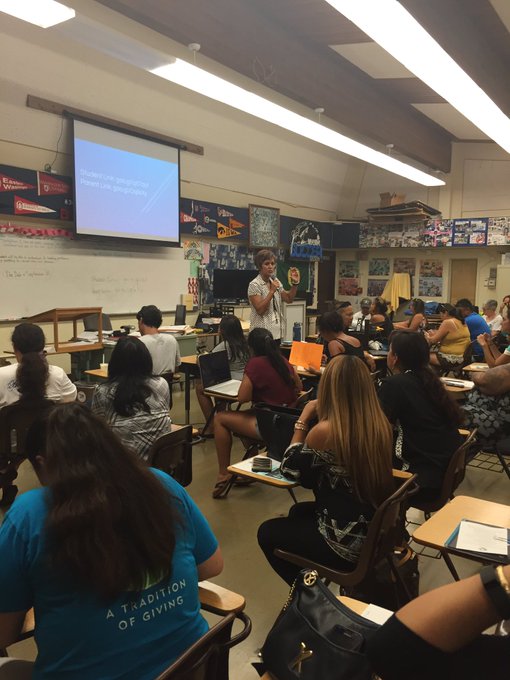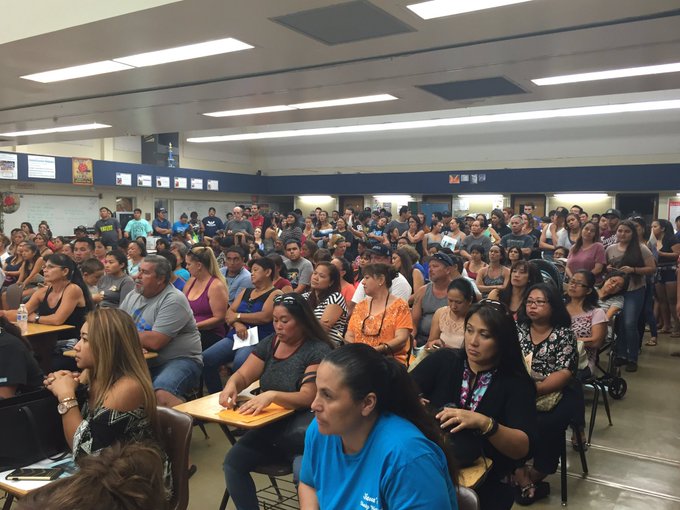Kauai, Waimea lead charge in slashing literacy remediation
News Release from Hawaii DoE, 20-Oct-2016
With little fanfare and a strong commitment to boosting student literacy, Kauai and Waimea high schools are leading the state in reducing English remediation in college. The Garden Island schools have different approaches but a shared goal of "Literacy in all subjects." They'll share what they've learned and what's working for them at a state literacy conference in December.

Source: Hawaii DXP
Not only are more public school graduates going to college, they’re ready for it when they get there.
Among a lot of promising college and career readiness data from Hawaii’s public schools, the drop in remediation rates (retaking high-school-level coursework) among students attending the University of Hawaii System is a particularly bright spot — down 8 points in math and 6 points in English in three years. Thanks to the innovative work of teachers and school teams, hundreds more students are learning and retaining the skills and knowledge they need to succeed in core subjects.
ENGLISH & MATHEMATICS REMEDIATION: HIDOE STUDENTS AT UH
|
MATH |
ENGLISH |
| Class of 2012 |
1,593 students |
36% |
1,357 students |
31% |
| Class of 2015 |
1,101 students |
28% |
976 students |
25% |
In particular, Kauai High and Waimea High are leading the state in driving down English remediation (see chart, top). They will share what’s working for them at a state literacy summit in December.
A common theme at both schools is rigor and relevance — setting high expectations, and connecting those to real-world outcomes at every opportunity. Here are their stories.
Kauai High — "We kept a sustained focus."
2012-15 REMEDIATION REDUCTION: 40% to 13%
The English department’s quest to boost student literacy was served well by taking the long view. It started with the right foundation.
Kauai High started using Common Core standards in 2009, well before the state came on board — HIDOE phased in the Common Core English Language Arts/Literacy (ELA) standards starting 2011-12, with full implementation in 2013-14. Members of the school’s English department worked with the state’s ELA resource teacher Petra Schatz on a content panel and decided the standards were the right direction.
“We did an in-depth study and it got us to think deeply about vertical alignment, all teachers having the same focus,” said Jonathan Medeiros, head of the English department at Kauai High.
Shortly after Kauai High’s move to embrace Common Core ELA, the school opened Advanced Placement language arts classes to all students, and then the following year the state’s graduation requirements were updated to include a half-credit of expository reading and writing, modeled on California State University’s composition classes.
“After these adjustments, all grades were focused on a similar set of skills that were more aligned with what they would need to do in college — using text to support analysis,” Medeiros said. “And then we had every single 11th and 12th grader taking AP or college-level English.”
So with all the chess pieces perfectly assembled, increased literacy unfolded with mathematical precision? Not quite.
“The most dramatic drop in remediation rates was from 2012 to 2015, but it bounced up and down for a little while, year over year,” Medeiros said. “It was important to sustain our focus during that time.”

The process “reaffirmed to me that to see these kinds of results take a long time, and you have to have that patience,” he said. “You can’t just throw something out after one or two years.”
During those transitional years, these are the best practices that helped Kauai High stick with a strong foundation, and build the scaffolding to support the effort.
CONSISTENCY
The English department starts and ends each school year by revisiting its priority standards and reaffirming the focus. “The English department is passionate about literacy and we keep it on track. We’re broken into grade-level teams that work horizontally across disciplines, making sure the skillsets that we’ve identified are implemented.”
Focused professional development during the year has a big impact. “Two years ago, we’d had a lot of turnover in the 9th grade teaching ranks — retiring, moving, personal reasons. We wanted to lock in what everyone was doing to make sure we wouldn’t drift, reinforcing key skills — analyzing what an author is attempting to convey versus just summarizing text, creating and supporting an argument. We needed to avoid ripple effects into 10th and 11th grades so we used a couple hours of one PD session to refocus and make sure we weren’t stepping on each other’s toes.”
He added, “If I feel the department needs the work, I’ve been granted the time to make it happen. It helps to have that extra support.”
Training sessions on standards and curriculum at the state level have helped fill the gaps as new teachers came aboard. “It lays the foundation and they’re ready to hit the ground running and work with the rest of us.”
ENGAGEMENT
Medeiros asked his students what’s working for them. They agree that having multiple approaches to learning and working with texts is keeping them motivated in class.
“To survive 40 minutes of class, they have to do a different learning task every 10 to 15 minutes,” he said. “They’re not just sitting and reading and taking a test — passive. They’re expressing original analysis, delivering a speech, writing a poem. And it’s not just one type of text, it’s across disciplines and it’s preparing them for the interconnected nature of college and the world.”
“Students enjoy it because it’s not boring. Plus the teachers really enjoy the subjects — their engagement helps get students involved as well.”
POSITIVE CULTURE
“I came here 11 years ago, and I’m one of two Language Arts teachers who remain since then, but the culture of the English department is the same — we enjoy each others’ company, we enjoy teaching and getting better at teaching. That is thebiggest thing,” Medeiros said. “As a school, Common Core has been a priority for the last few years, and though I wouldn’t say all teachers are taking the standards as seriously as they should, the atmosphere in the entire school is ‘Literacy in all subjects.’”

Waimea High — "We think of ourselves as a ‘9-16 entity’ now.”
2012-15 REMEDIATION REDUCTION: 44% to 21%
Principal Mahina Anguay noted the students at Waimea High are no longer viewed as moving through grades 9 to 12, but moving into life beyond school. Backing that up meant shifting what “high school teaching” meant.
“This is forcing all of us to find post-high-school connections and increasing content literacy in what we do,” Anguay said. “For example a 9th grade social studies teacher has to think about what specific skills she’ll be teaching that will help a student who is determined to be a chemical engineer one day.”
Waimea High is doing next-level Career and Technical Education that closely aligns career pathways to core subjects, she said. “We send kids out on internships, teachers out on externships, we bring in people to work with our classes, we send classes out to do community-based performance tasks.”
That provides the relevance for students — the “why” we’re doing it. The rigor is provided through literacy programs including Accelerated Reading and Achieve 3000. Students are given assignments in the Achieve 3000 platform across all subjects except math, doing deep reading and comprehension work on fiction and non-fiction texts of escalating complexity (known as a Lexile level). To sustain the effectiveness of the program, teachers and admins engage in one-on-one conferencing with the students before they’re placed into it — orienting them to what they were scoring and where they should be scoring. “It’s incredible how much they improve … it’s a matter of pride,” Anguay said.
Parents are partners in this effort, and the school has invested in outreach and training to ensure learning continues off campus. “Students need to understand why reading is so important to their future — we reinforce it at every opportunity,” Anguay said. “We also have spent a lot of time and money on parent night learning with Achieve so parents understand how important it is to maintain a minimum Lexile level and how they can help to support their child at home with the program.”


Family involvement on display at Waimea High, Sept. 14, 2016.
Flexibility and structure in the bell schedule supports teachers, coaches and administrators in coordinating these interlocking efforts so they can better function as a multilayered team:
- Department heads share a common prep period. “It allows us to have department head meetings within the school day, and allows them to get into classes and mentor their members, either to observe and support them, or cover their classes so they can observe another teacher,” Anguay said.
- The school has a ‘skinny’ Monday where students attend seven classes, then blocks of classroom time and collaboration time are held Tuesday to Thursday.
- Depending on the balance of what’s needed that week, teachers get time back Friday to work on grades or anything thing else they need to complete.
“It’s a lot of work,” Anguay said. “Meetings are planned and shared at the beginning of the school year, so everyone knows what to be prepared for. I’m super transparent with my staff.”
2016 English Language Arts Summit--College & Career Readiness in English Language Arts | December 2, 2016
This statewide summit will convene Hawai‘i Department of Education and higher education administrators, ELA faculty, ELA teachers, and teacher preparation faculty to share best practices for college and career readiness in English Language Arts. One main objective for the summit is to promote discussions about strengthening English Language Arts transitional pipelines from high school to the gateway courses in higher education.
The keynote speaker will be Jennifer Fletcher, author of the new book, "Teaching Arguments: Rhetorical Comprehension, Critique, and Response." Hosted by Hawai’i P-20 Partnerships for Education.